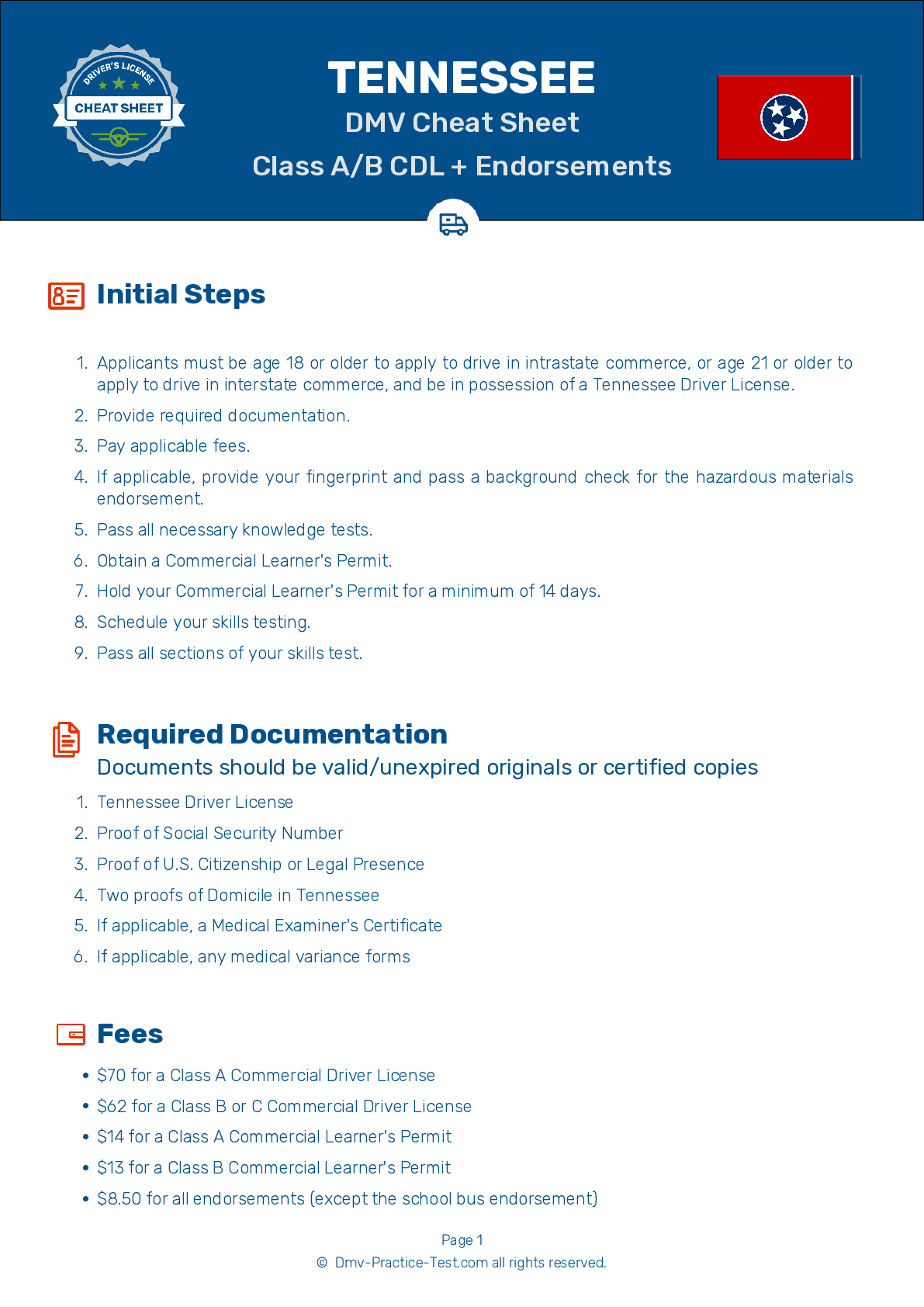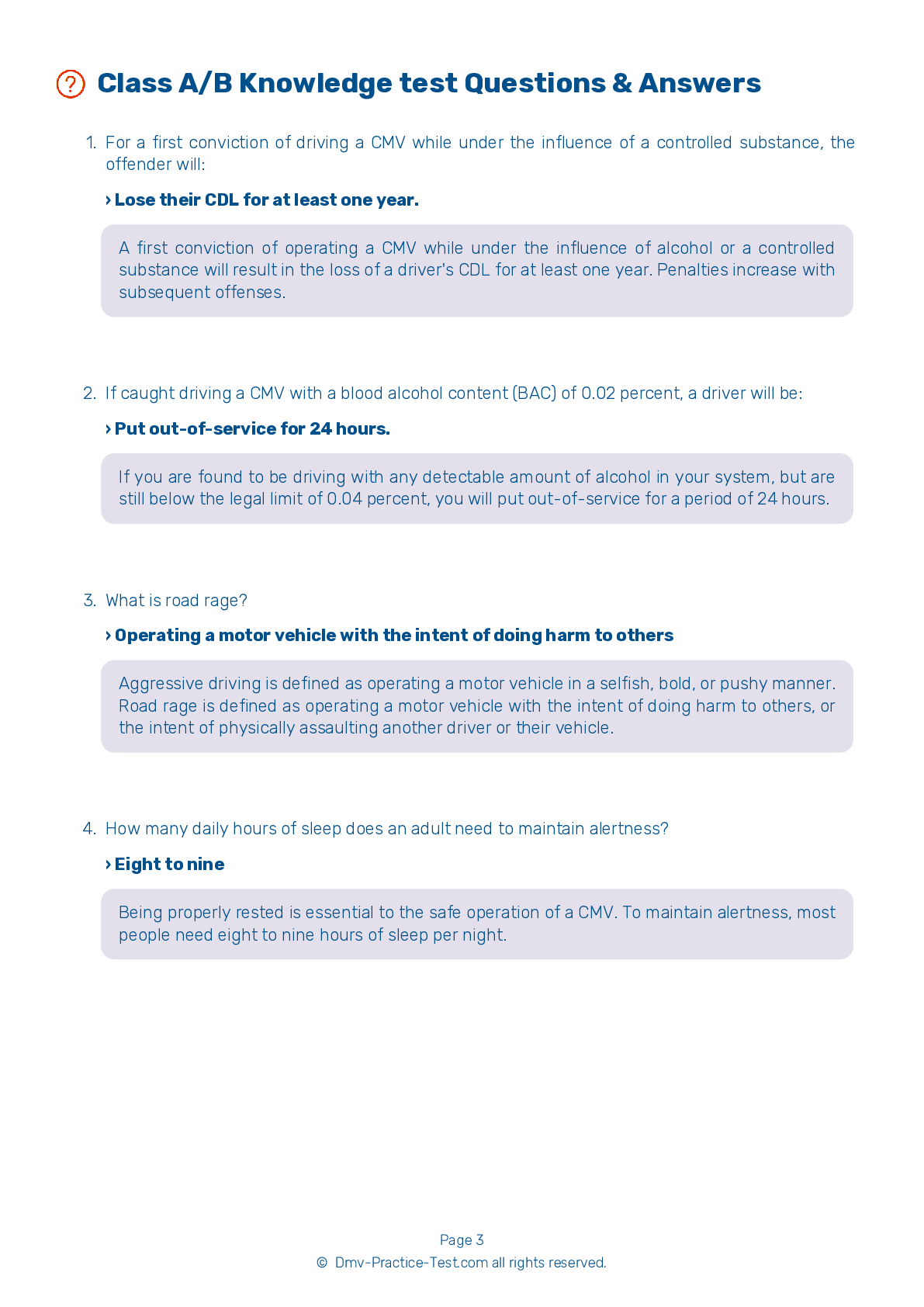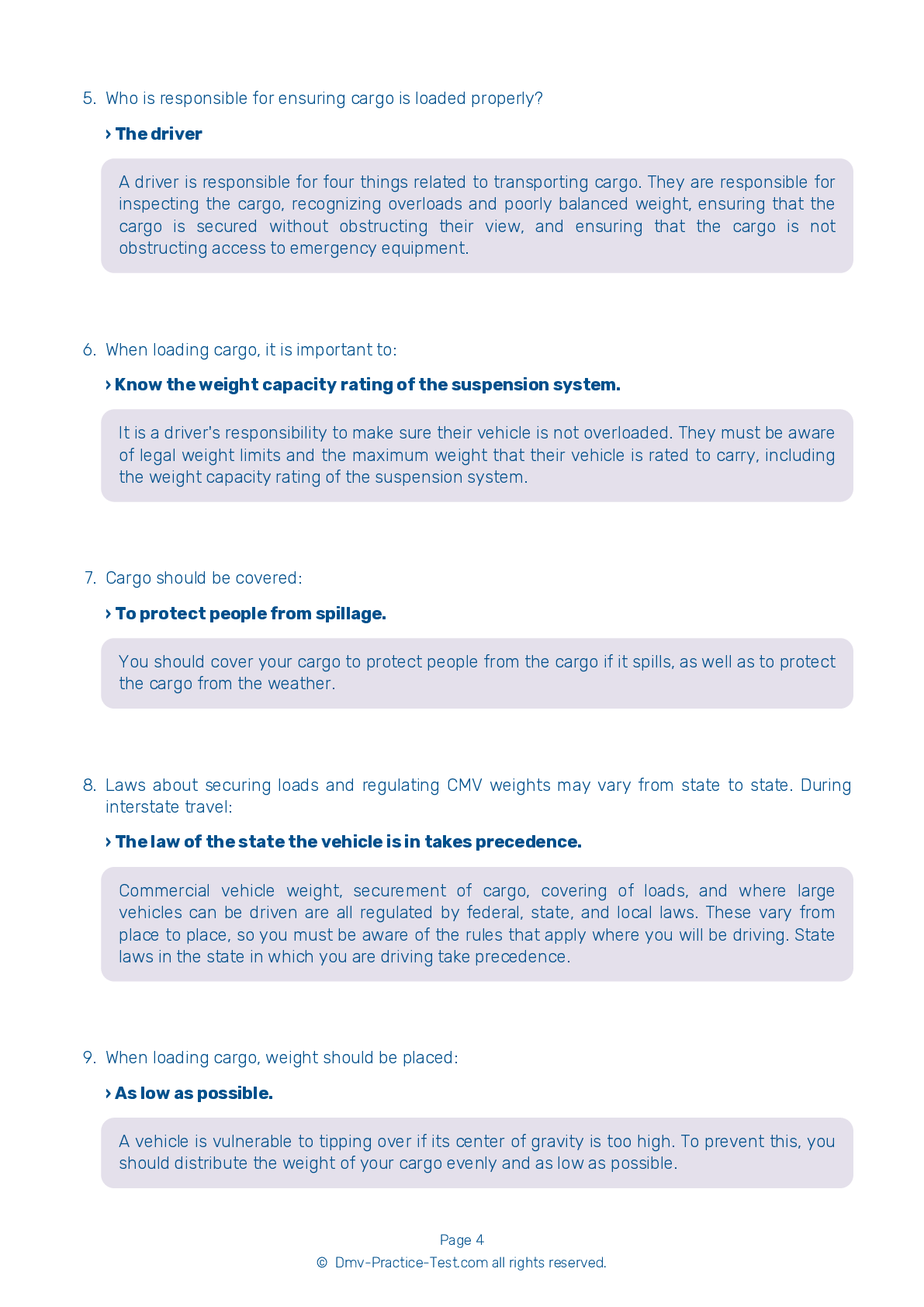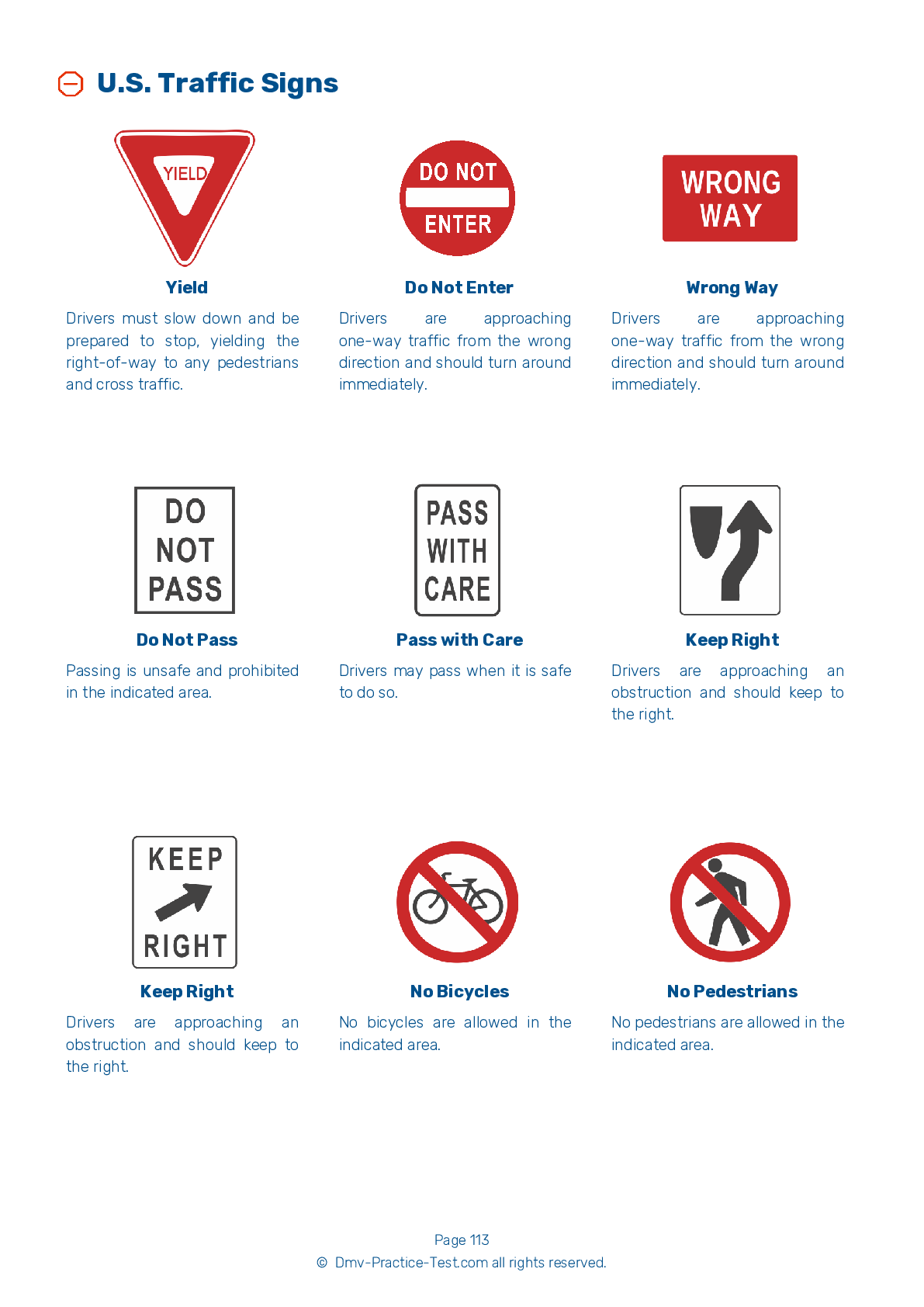HazMat #1
Hazmat Test | Tennessee 2026 #1
On our website, we provide FREE practice - CDL hazmat test online! The official exam test consists of several obligatory parts, with all of them checking your knowledge of different blocks of road rules. If you need to obtain a TN CDL hazmat endorsement in 2026, practice as much as possible. Free sample tests published on our website will help you check and improve your knowledge and boost your grades. Please bear in mind that Tennessee requirements for issuing a hazmat endorsement for CDL may vary from those established in other states.
30
24
20
1 . A person should not smoke within ____ of a vehicle placarded for Class 3 or Division 2.1 materials.
1,000 feet
A person should not smoke within 25 feet of a placarded tank that is used to transport Class 3 (flammable liquids) or Division 2.1 (gases) materials. Additionally, no person should smoke or carry a lit cigar, cigarette, or pipe within 25 feet of any vehicle containing Class 1 (explosives), Class 4 (flammable solids), or Class 4.2 (spontaneously combustible).
2 . Who is responsible for identifying the hazard class of materials being shipped?
The mechanic
The shipper of hazardous materials is responsible for identifying the product's identification number; proper shipping name; hazard class; packing group; and correct packaging, labels, marking, and placards.
3 . If a driver is given a leaking package or shipment, they should:
Get someone else to drive it.
It is a driver's responsibility to refuse packages or shipments of hazardous materials if they contain leaks.
4 . If you are transporting Class 3 flammable liquids and your cargo needs to be moved into another tank, the flammable liquids:
Should be transferred at night.
Flammable liquids should not be transferred from one vehicle to another on a public roadway, unless being moved due to an emergency. Always warn others of the hazards presented by the materials.
5 . Which agency helps coordinate emergency response to chemical hazards?
The National Response Center helps coordinate emergency response to chemical hazards. It should be contacted in the event of a hazardous materials spill.
6 . You can find the identification numbers assigned to hazardous chemicals:
The U.S. Department of Transportation (DOT)'s Emergency Response Guide provides information about hazardous materials, indexed by proper shipping names and hazardous materials identification numbers.
2026 Tennessee | Frequently Asked Questions
A CDL Class A license in Tennessee allows the holder to operate any combination of vehicles with a Gross Combination Weight Rating (GCWR) of 26,001 pounds or more, provided the Gross Vehicle Weight Rating (GVWR) of the vehicle(s) being towed exceeds 10,000 pounds. It covers vehicles like tractor-trailers, truck and trailer combinations, and flatbeds.
A Class A CDL license in Tennessee allows the holder to operate vehicles such as tractor-trailers, truck and trailer combinations, flatbeds, tanker vehicles, and livestock carriers. It is typically used for long-haul or over-the-road (OTR) trucking. The license covers any vehicle with a GCWR of 26,001 pounds or more if the towed vehicle is over 10,000 pounds.
To obtain a Class A CDL license in Tennessee, you must be at least 21 years old (18-20 years for intrastate driving), possess a valid Tennessee driver's license, pass a vision test, and successfully complete both a knowledge test and a skills test. You'll also need to provide proof of citizenship or lawful permanent residency.
In Tennessee, you must be at least 21 years old to qualify for a Class A Commercial Driver's License (CDL) for interstate driving. However, you can obtain a Class A CDL for intrastate driving (within Tennessee) if you are at least 18 years old.
Specific endorsements are not required for a Class A CDL license, but they can expand your job opportunities. Endorsements allow you to operate specific types of vehicles, such as tank vehicles (N), passenger vehicles (P), school buses (S), or vehicles carrying hazardous materials (H). Each endorsement requires passing additional knowledge and/or skills tests.
The Class A CDL skills test in Tennessee encompasses three parts: a pre-trip inspection to confirm that your vehicle is safe to drive, a basic vehicle control test to demonstrate your ability to maneuver and control the vehicle, and an on-road driving test where you'll be evaluated on your interaction with traffic and adherence to safety rules.
Yes, there can be limitations on Class A CDL license holders. These are typically represented as restrictions noted on the license. For example, if you take your skills test in a vehicle without air brakes, you'll have an "L" restriction and can't operate vehicles with air brakes. Other restrictions can relate to medical conditions or the specific type of vehicle used for testing.
In Tennessee, the Class A CDL written test is primarily administered in English. However, some locations may offer the test in Spanish. It's important to note that all CDL holders must be able to read and speak English well enough to communicate with the general public, understand highway traffic signs and signals, respond to official inquiries, and make entries on reports and records.
Yes, you can request accommodations for the Class A CDL written test if you have a disability. The Tennessee Department of Safety & Homeland Security is committed to ensuring accessibility for all test takers. You should contact them directly ahead of your scheduled test to discuss your specific needs and arrange appropriate accommodations.
If you don't pass the Class A CDL written test, you can retake it. However, you must wait at least one day before retesting. There's no limit on how many times you can retake the test, but each attempt requires a fee. It's advisable to study thoroughly before retesting to increase your chances of passing.



